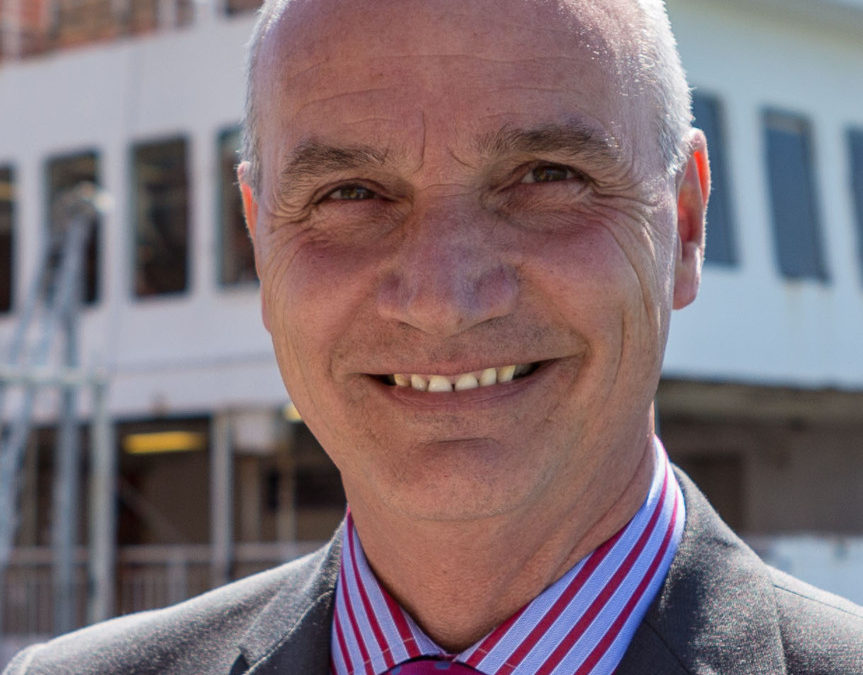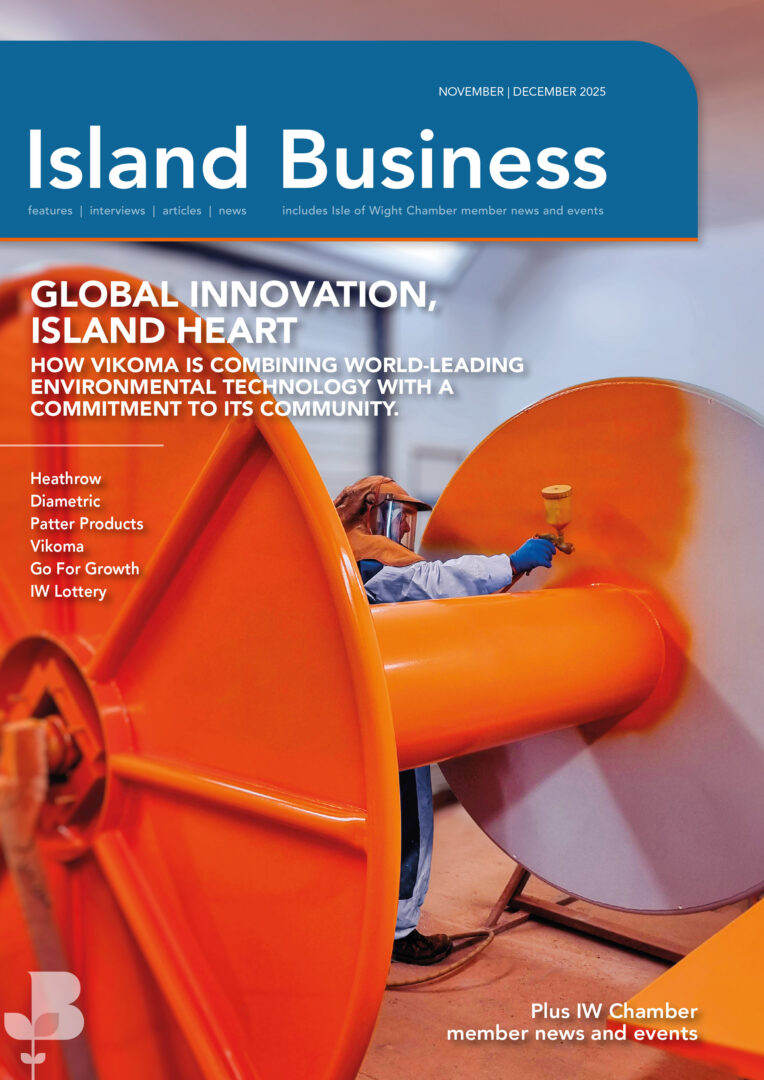Tom Stroud talks to John Burrows, Wightlink’s Chief Operating Officer.
How important is the Isle of Wight to Wightlink?
Without the Isle of Wight our company wouldn’t exist. Our office is on the mainland but over a third of our employees are Island residents. The Island is crucial and our tagline is “Part of Island life.” We’re a business that serves the needs of Islanders and the tourists that come across here. We consult with residents when we are looking to make changes. We support charities and groups with subsidised and discounted ferry tickets. We have a range of discounted fares that are only available to Island residents, including for hospital appointments.
Is it a competitive marketplace?
Of course it is, and you’d expect me to say that. Stephen Hammond, the Parliamentary Under Secretary of State for Transport has said quite categorically that the market is working well, with around 300 sailings nearly every day of the year. Our customers do move between us and Red Funnel. There are times when they are cheaper than us and there are times when we’re cheaper than them. That demonstrates to me that the market is working well. Business is looking up at the moment. We’ve had some great weather and we’re hopeful that this summer will be a really good season. Our advance bookings are also looking really good.
It is a seasonal market though isn’t it? That must impact on trying to run an all year round profitable business.
It is extremely seasonal. Our core market is Island residents, making up around a third of our market, and they travel all year. Two thirds of our business comes from visitors coming to the Island and the challenge for us is to encourage them to travel at the right times. During our peak times, on summer Saturdays, the festivals and at Easter we’re going to have every vessel running to capacity and we simply can’t take any more. We need to extend the season and develop an off-season business, encouraging people to come across during the winter as well. Nobody travels with Wightlink because they want to use a ferry – they’re travelling because they’re heading to the Isle Of Wight as a destination. That’s why the vast majority of our marketing spend is put through Visit Isle of Wight. The Isle Of Wight is not difficult or expensive to get to. If you book early and you’re flexible you get the best fares.
You’ve been holding “Meet the Managers” events over the last few months. What have you learned from that?
It’s been very interesting. It gave us the opportunity to talk to our customers and explain our business in more detail. We got a lot of feedback and we’ve made a number of changes. We fixed some anomalies in our booking system and we’ve changed some of our sailing times too. We are a commercial operation. We receive no subsidy whatsoever. We’re unlike the buses or the trains and we can only run a service that is commercially viable. I suspect a lot of people don’t realise that over 30% of the sailngs that we operate actually lose money. In the winter, 40% of our savings lose money and there are whole days when the Lymington to Yarmouth route actually makes no profit at all. I think that demonstrates a commitment to Island life. Our task is to make sure we fill those sailings. We have a service ethos, we have to provide a public service and we will do. The way to add sailings to our schedule is to generate business, going to and from the Island, with a vibrant island economy and that way everybody benefits.
What’s it been like having your business discussed so often and so openly over the last year?
I think ferries are always very high profile and you punch way above your weight in terms of the media. If I’m honest, a year ago when the scrutiny process started, we were probably a bit concerned about it. As the process went on it became clear that we had a strong story to tell and, if we’re honest, we probably hadn’t been getting that message out into the marketplace in the past. The scrutiny process focused our minds and made us look at what we do, how we do it and how we can improve. We have consulted a lot more with our customers since. We’ve always carried out customer research but we’ve become more focused and more organised. It’s been a healthy process and I would have no qualms about going through it again. I guess when you’re market leader you’re there to be shot down. We do carry the vast majority of customers to and from the Island and we’re always going to get more criticism. It’s slightly frustrating when you get negative publicity but that’s life isn’t it? It’s been levelled at us that the cost of fares puts people off travelling to the Island. The latest Visit England survey disproves that and we need to make sure our tourist’s perceptions aren’t distorted.
What about this idea that Wightlink is for sale and could be bought by a local consortium. Is that pie in the sky?
I think it is really and we shouldn’t get distracted by it. The company shares are held by an investment fund, managed by Macquarie and that has no bearing on how we run the business day to day. I guess any business is for sale at the right price but we’re definitely not looking for offers at the moment. Our current owners are long-term investors and they’ve invested over £70 million during the last six or seven years to improve service. Our focus as a management team is making sure we provide the level of service that our customers want. We’re working hard to improve the Island economy and we have a responsibility to do that.
How do you see the business changing? Is the Isle Of Wight changing and do you have to adapt to that?
The world is changing. The Isle Of Wight, in some ways is changing a lot slower than other places. It’s very rural, not necessarily part of the rat race and that’s part of the appeal. We’d like to do more sailings but that can only be achieved when they are financially viable. We cannot operate more sailings, at a loss, than we are doing at the moment. We want to see more customers on our vessels and more engagement with the Island.
We have invested significantly in the last seven years. We’ve brought in three purpose-built ships for the Lymington-Yarmouth route, replacing very aged vessels. We purchased two new catamarans for the Portsmouth-Ryde route and our level of reliability has improved dramatically. We’ve rebuilt the Fishbourne terminal with a meeting room that is available to community groups. We’ve also rebuilt Ryde Pier completely, from top to bottom, a mammoth project that has protected some Island heritage too. The top deck of the St Clare ferry has been refurbished completely and our intention is to do the lower deck next year. We need to do more, particularly on the Portsmouth-Fishbourne route. Cars are getting bigger so we’re now getting fewer vehicles on each crossing. That has an impact on our revenue opportunities and, going forward, we have to make sure that the volume of business justifies that level of investment.
Is perception one of your challenges? When you explain the nature and complexity of running a ferry company do people go away happier?
The more we talk to our customers the better our service becomes. It’s extremely rewarding when you spend time with people explaining the complexity of the business. I think we need to get clearer in our messaging. I understand that in a perfect world people would like a ferry to be there, on demand, and that they would also like it to be free. We don’t live in a perfect world and I think we do a pretty good job. We don’t get it right all of the time and we want to put it right when we get it wrong.
First published in the July 2014 issue of Island Business magazine.





